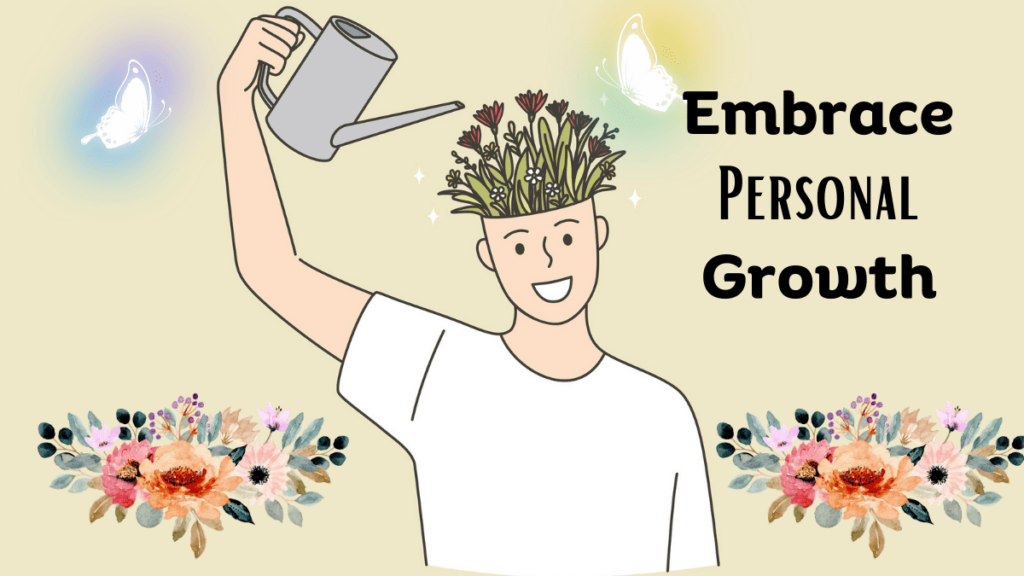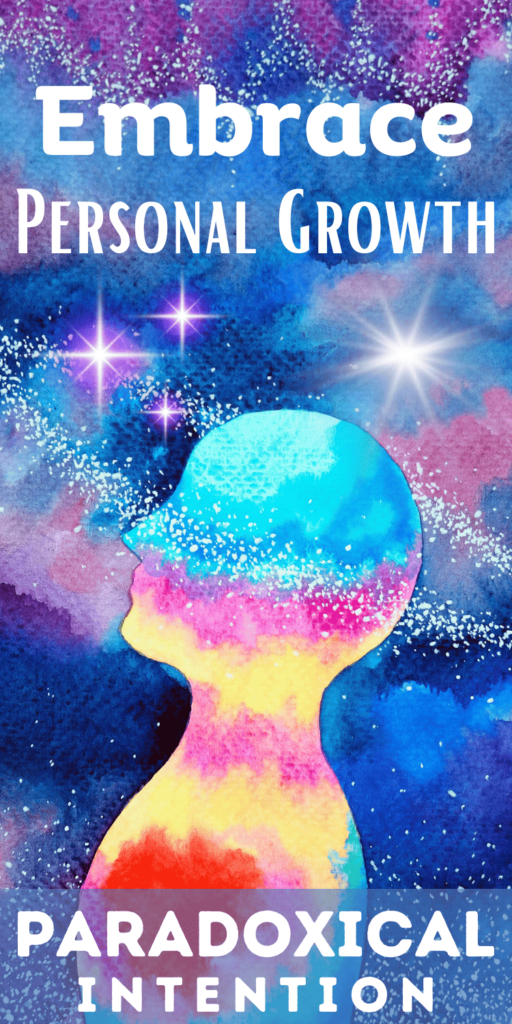In the hustle and bustle of modern life, we often overlook the transformative power that lies within ourselves.
We seek change in external circumstances, unaware of the untapped potential for growth that resides within our own minds and hearts.
As the New Year approaches, inviting resolutions and aspirations, let’s embark on a journey of unconventional self-growth, exploring the depths of human potential and unleashing the extraordinary within us.
This article delves into six unconventional yet potent approaches to self-growth, guiding you away from the well-trodden paths of self-improvement and towards a transformative experience that challenges, liberates, and empowers.
Prepare to embrace vulnerability, cultivate self-curiosity, navigate paradoxes, and accept impermanence – all while embracing the profound wisdom of non-attachment and self-compassion.

Cultivating Self-Curiosity: Embarking on a Journey of Self-Discovery
In the grand orchestra of self-discovery, curiosity plays the role of an intrepid conductor, guiding us towards a deeper understanding of our inner melodies.
Instead of approaching ourselves with the harsh critique of a stern judge, let’s embrace the role of an inquisitive explorer, venturing into the uncharted territories of our minds and hearts.
Self-curiosity is not about seeking validation or external approval; it’s about embarking on a journey of self-discovery, free from the shackles of judgment and preconceived notions.
It’s about asking open-ended questions, not seeking definitive answers. It’s about peeling back the layers of our conditioning, revealing the authentic essence that lies beneath.
To cultivate self-curiosity, start by observing your thoughts, feelings, and behaviors without judgment.
Notice the patterns that emerge, the triggers that spark certain emotions, and the underlying motivations that drive your actions.
Embrace the contradictions and complexities that make you uniquely you.
Engage in activities that stimulate your mind and ignite your passions. Explore new hobbies, delve into unfamiliar subjects, and surround yourself with people who challenge your perspectives.
Allow yourself to be a student of life, constantly learning and evolving.
As you cultivate self-curiosity, you’ll discover a hidden dimension within yourself, a wellspring of untapped potential.
You’ll gain a deeper understanding of your strengths, weaknesses, and values, empowering you to make conscious choices that align with your authentic self.
Instead of simply reacting to your emotions, take a moment to pause and observe them with curiosity. Ask yourself questions like: "What is this emotion telling me?" "What triggered this feeling?" "What physical sensations am I experiencing?" By approaching your emotions with curiosity rather than judgment, you can gain valuable insights into your inner world.
Embracing Vulnerability: Awakening Inner Strength Through Authenticity
In a world that often equates vulnerability with weakness, we’ve constructed elaborate defenses to shield our true selves from potential judgment and rejection.
However, true strength lies not in hiding our vulnerabilities but in embracing them with courage and grace.
Vulnerability is not about seeking pity or attention; it’s about acknowledging our imperfections, expressing our feelings authentically, and allowing ourselves to be seen and heard in all our rawness.
It’s about opening our hearts to connection, knowing that true intimacy can only blossom in the presence of vulnerability.
When we embrace vulnerability, we create space for empathy, compassion, and genuine connection.
We break down the walls that separate us and foster deeper relationships with ourselves and others. We allow others to see the real us, imperfections and all, and invite them to connect with us on a deeper level.
To embrace vulnerability, start by practicing self-compassion. Acknowledge that everyone makes mistakes, experiences setbacks, and harbors insecurities.
Treat yourself with kindness, understanding, and forgiveness.
As you cultivate self-compassion, you’ll find it easier to extend the same kindness to others.
You’ll be less afraid to express your true feelings, even those that might be perceived as negative. You’ll be more open to receiving feedback, both positive and constructive.
Embrace vulnerability, and you’ll discover a strength you never knew you possessed.
You’ll find the courage to be your authentic self, to live in the present moment, and to connect with others on a deeper level.
Vulnerability is not a sign of weakness; it’s the foundation of authentic strength.
Share a personal story or experience that makes you feel vulnerable with a trusted friend or loved one. This could be a time when you made a mistake, experienced a setback, or felt overwhelmed by emotions. By sharing your vulnerability, you strengthen your connection with others and build trust in yourself.

Radical Acceptance: Liberating Yourself from the Grip of Resistance
Life often presents us with circumstances that we wish we could change – a difficult relationship, an unexpected loss, a persistent health issue. In our attempts to alter these realities, we can become trapped in a cycle of struggle and frustration.
Radical acceptance offers a different path, one of acceptance and empowerment.

Radical acceptance is not about surrendering or giving up; it’s about recognizing the reality of the situation and channeling our energy into constructive actions.
It’s about accepting things as they are, not because we like them, but because it allows us to move forward with greater clarity and purpose.
When we practice radical acceptance, we release ourselves from the burden of constantly striving to change what we cannot. We free up our mental and emotional energy to focus on what we can control – our thoughts, feelings, and actions.
We create space for growth, resilience, and a more peaceful approach to life’s challenges.
To practice radical acceptance, start by identifying the areas of your life where you’re fighting against an unchangeable reality.
Are you holding onto a relationship that’s no longer serving you? Are you dwelling on a past mistake that you can’t undo? Are you resisting a difficult life circumstance that’s beyond your control?
Once you’ve identified these areas, acknowledge the reality of the situation. Accept that things are as they are, even if you don’t like it.
This doesn’t mean you’re giving up; it means you’re acknowledging the truth, which is the first step towards moving forward.
Next, focus on what you can control. Instead of fighting against the unchangeable, channel your energy into constructive actions.
Can you improve your communication patterns in a troubled relationship? Can you learn from your past mistakes and make different choices in the future? Can you find ways to adapt and cope with a difficult life circumstance?
Radical acceptance is a powerful tool for navigating life’s challenges.
It allows us to release the burden of constant struggle, find peace in the midst of adversity, and channel our energy into meaningful actions that shape our lives in a positive direction.
If you struggle with procrastination, instead of fighting against the urge to delay, acknowledge and accept it. Label your thoughts and feelings without judgment, such as "I'm noticing a feeling of resistance to starting this task." Then, gently redirect your attention to the task at hand, taking small steps forward.
Paradoxical Intention: Harnessing the Power of Counterintuitive Thinking
Our minds often resist change, especially when it comes to overcoming unwanted habits or behaviors.
We try to suppress our thoughts and urges, only to find them resurfacing with even greater intensity.
Paradoxically, embracing the unwanted can be a surprisingly effective approach to personal growth.
Paradoxical intention involves embracing the very thing we want to change. Instead of resisting an unwanted thought or behavior, we intentionally focus on it, accepting it without judgment.
This counterintuitive approach can disarm the resistance within us, allowing for change to occur naturally.
To apply paradoxical intention, identify an unwanted thought or behavior that you’ve been trying to suppress.
Whether it’s procrastination, negative self-talk, or an unhealthy habit, acknowledge its presence without judgment.
Instead of trying to fight against the unwanted behavior, paradoxically embrace it.
Give it your full attention, allowing it to unfold without resistance. Observe your thoughts and feelings without trying to change them.
As you practice paradoxical intention, you may notice a shift in your relationship with the unwanted behavior. The resistance you once felt may begin to dissipate, replaced by a sense of acceptance and understanding.
This newfound acceptance can pave the way for natural change, as you no longer feel the need to fight against yourself.
Paradoxical intention is not a magic bullet, but it can be a powerful tool for overcoming resistance and facilitating personal growth.
By embracing the unwanted, we can disarm the inner battles that hold us back and create space for positive change to emerge.
If you find yourself dwelling on negative thoughts, try embracing them paradoxically. Instead of trying to suppress them, intentionally focus on those thoughts, allowing them to unfold without resistance. This counterintuitive approach can disarm the resistance within you, allowing the thoughts to dissipate naturally.

Embracing Impermanence: Navigating Life’s Constant Flux
In the grand tapestry of existence, change is the ubiquitous thread that weaves through every moment, every experience, every facet of our lives.
Yet, despite its inevitability, we often cling to the illusion of permanence, seeking stability in a world that is inherently fluid.
This resistance to change can trap us in a state of anxiety, fear, and an inability to fully embrace the richness of life’s experiences.
The essence of impermanence lies in the transient nature of all things – our thoughts, emotions, relationships, possessions, and even our physical bodies.
Nothing remains the same, everything is in a constant state of flux. This concept, while often perceived as daunting, holds within it the seeds of profound liberation and personal growth.
When we embrace impermanence, we release ourselves from the shackles of rigid expectations and attachment to outcomes.
We open ourselves up to the transformative power of change, allowing it to guide us towards new possibilities, unexplored territories of our own potential.
To embrace impermanence, we must begin by acknowledging its presence in our daily lives.
Notice the changing seasons, the fleeting moments of joy and sorrow, the continuous evolution of our relationships. Observe how even our thoughts and emotions arise, transform, and dissipate, like waves on the shore.
Once we recognize the pervasiveness of impermanence, we can start to cultivate an attitude of acceptance and openness. Instead of resisting change, we can approach it with curiosity and a willingness to learn.
We can view challenges as opportunities for growth and transformation, rather than setbacks that hinder our progress.
Embracing impermanence also invites us to savor the present moment, to appreciate the unique beauty and significance of each fleeting experience.
We can cultivate mindfulness, bringing our attention to the present moment without judgment, allowing ourselves to fully engage with the world around us.
The journey of embracing impermanence is not without its challenges. It requires a willingness to let go of control, to surrender to the unknown, and to trust in the transformative power of change. However, the rewards are immense.
By embracing impermanence, we liberate ourselves from the grip of fear and anxiety, allowing ourselves to live more fully, authentically, and connected to the flow of life.
Here are some practical ways to cultivate acceptance of impermanence:
- Practice mindfulness: Regularly engage in mindfulness exercises, such as meditation or deep breathing, to cultivate awareness of the present moment and the transient nature of thoughts and emotions.
- Embrace gratitude: Express gratitude for the positive aspects of your life, both big and small, to shift your focus from the impermanence of things to the abundance that surrounds you.
- View challenges as opportunities for growth: Reframe challenges as opportunities to learn, adapt, and develop new skills and perspectives.
- Celebrate transitions: Acknowledge and celebrate significant life transitions, both positive and challenging, as markers of growth and transformation.
Start a gratitude journal and regularly reflect on the positive aspects of your life, both big and small. This practice can help you appreciate the impermanence of things and shift your focus from the things that change to the abundance that surrounds you.

Remember, embracing impermanence is not about resignation or nihilism; it’s about recognizing the inherent nature of life and embracing its transformative power. It’s about living more fully, authentically, and connected to the flow of existence.
Practicing Self-Compassion: Nurturing Kindness Towards Yourself
In the relentless pursuit of self-improvement, we often overlook the profound power of self-compassion.
While we strive to excel in various aspects of our lives, we often neglect to extend the same kindness and understanding to ourselves.
Self-compassion is not about self-indulgence or self-pity; it’s about treating ourselves with the same kindness and understanding we would extend to a close friend.
Self-compassion involves three key elements: self-kindness, common humanity, and mindfulness.
Self-kindness means treating ourselves with understanding and acceptance, rather than harsh judgment and criticism.
Common humanity means recognizing that everyone makes mistakes and experiences setbacks, and that we are not alone in our imperfections.
Mindfulness means being aware of our thoughts, feelings, and emotions without judgment, allowing us to navigate challenges with greater clarity and compassion.
To cultivate self-compassion, start by observing your inner critic, the voice that judges and belittles you when you make mistakes or fall short of your expectations.
Notice how this critic’s harsh words can contribute to feelings of inadequacy, shame, and self-doubt.
Next, challenge the validity of your inner critic’s judgments. Are these judgments based on realistic expectations or perfectionistic standards? Are they truly helpful or are they simply undermining your self-esteem?
Instead of listening to the inner critic, cultivate a voice of self-compassion. Talk to yourself with the same kindness and understanding you would offer a friend going through a difficult time.
Acknowledge your mistakes, learn from them, and then forgive yourself.
Practice self-compassion not only when you make mistakes but also in everyday moments. When you experience negative emotions, such as sadness or frustration, allow yourself to feel them without judgment.
Label your emotions without attaching to them, and remind yourself that everyone experiences these emotions from time to time.
Self-compassion is not a quick fix; it’s a journey of self-discovery and acceptance. It requires ongoing practice and a willingness to challenge our deeply ingrained patterns of self-criticism.
However, the rewards of self-compassion are immense. It can lead to increased self-esteem, resilience, and emotional well-being, allowing us to navigate life’s challenges with greater grace and equanimity.
Remember, self-compassion is not about becoming self-absorbed or narcissistic; it’s about extending to ourselves the same kindness and understanding we deserve.
By embracing self-compassion, we set the foundation for a more fulfilling and compassionate life.
When you make a mistake or experience a setback, instead of engaging in harsh self-criticism, treat yourself with the same kindness and understanding you would extend to a friend. Acknowledge your mistake, learn from it, and then forgive yourself.
Final Thoughts
In the pursuit of personal growth, we often seek out well-trodden paths, adhering to established formulas and conventional wisdom.
However, true transformation lies not in following the crowd, but in daring to venture beyond the familiar, embracing unconventional approaches that challenge our perceptions and unlock hidden potential.
The six unconventional ways explored in this article offer a glimpse into the transformative power of self-discovery, vulnerability, acceptance, paradox, impermanence, and self-compassion.
Each approach, in its own unique way, challenges us to shed the limiting beliefs and patterns that hold us back, allowing us to embrace a more authentic, resilient, and fulfilling existence.
As you step into the New Year, remember that these approaches are not rigid rules but rather invitations to explore the depths of your own being.
Embrace the challenges, celebrate the breakthroughs, and cherish the transformative power that lies within.
Let this New Year be the catalyst for a journey of self-discovery, authenticity, and limitless potential.
You may also be interested in: 1. Remember to Live. Your Time is Limited. 2. Binaural Beats & Brainwave Entrainment 3. Lifebook Online Will Change Your Life





